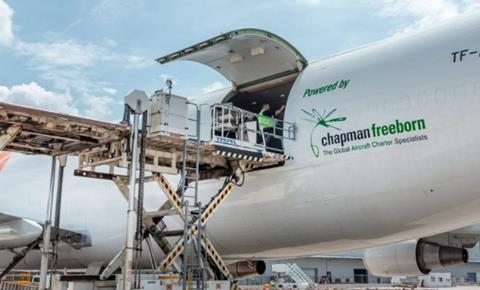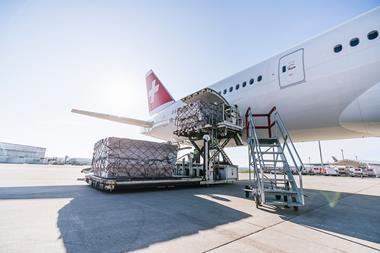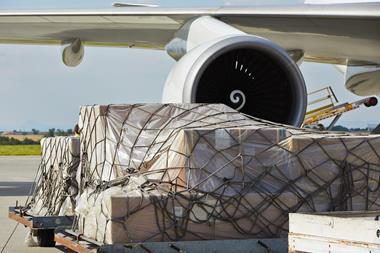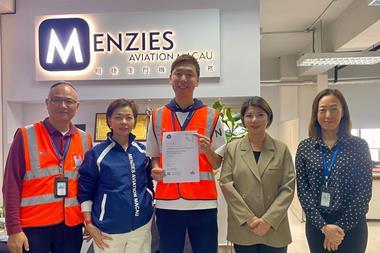Chapman Freeborn’s Marcel Kolb discusses the fast-paced nature of humanitarian air charter operations and the need for staff to go the extra mile to get the job done.
Aircraft do much more than deliver cargo. While serving with the German military in troubled Afghanistan, Marcel Kolb developed quite a special relationship with them: “You’d always look up into the sky to see if one was there. Perhaps you were hoping for a letter from home, or a spare part that you needed urgently. It’s actually that that drives my highest motivation.”
Now, in his current role as vice president government and humanitarian Europe with air charter specialist Chapman Freeborn, the planes he organises are often delivering life itself.
Whenever and wherever war, strife or natural disasters happen, there is a good chance that a Chapman Freeborn-chartered plane will be delivering urgent aid, equipment and vital material.
It wasn’t too big a step from the military to the air broking business for Kolb. “I was a company commander of logistics and fundamentally, there is no big difference in moving freight whoever it’s for.”
On leaving the full-time military – Kolb still keeps his hand in as a reserve Major and spends a few weeks every year keeping up his skills – it was a relatively short step to forwarder DB Schenker as vice president of global defence development and then on to his current role at Chapman Freeborn, which he joined about six months ago.
Here, he took on a complex vertical in the business, which as well as humanitarian aid also includes government, defence, air ambulance and civilian evacuations.
And it’s been a very busy six months for him, with earthquakes in Morocco, floods in Libya, Ukraine and the Gaza emergency. Trouble can break out at any time and the humanitarian team at Chapman Freeborn needs to be ready for it.
“One of the things we’ve been doing is drawing up an emergency action list. When we are aware of a disaster, that is the starting point for the team here in Gatwick. We need to work with carriers on aircraft availability, we need infrastructure on the ground, we need to think about fuelling and permits.”
You need to know the carriers, the capabilities of their aircraft, of the airports and the handling equipment they may use. There is no substitute for knowledge in this game – mostly, it isn’t information that you can look up on the Internet.
The more of that type of information is available to the Chapman Freeborn team and the more accurate and detailed it is, the quicker the response can be. And while global events are no more predictable, we can take some comfort from the fact that: “the world is actually getting better at reacting to them,” says Kolb.
Marcel Kolb couldn’t do all this on his own and he naturally works closely with the humanitarian team at Chapman Freeborn’s Gatwick Airport headquarters as well as the ‘Heroes’ (Human Emergency Response Operations, Evacuation and Solutions) team in Berlin.

Thinking on your feet
People working in humanitarian logistics need many qualities, including the ability to think on their feet, think outside the box and also be willing to forego weekends, holidays and a night’s rest – or more - when the occasion demands.
“Working on this team is not only about skills, it’s about having the right mindset and being willing – and able – to go the extra mile. They need to think up solutions ‘around the corner’. That might be using smaller airports, or trucking in some situations. They need communications skills, for clients and carriers.”
The teams are also given the freedom to make their own decisions as this is a fast-changing business. There may be a second earthquake, a government may withdraw permits for aircraft – and then perhaps reinstate them.
Strong nerves are another prerequisite. The recent Morocco earthquake was a case in point. The government there initially refused outside aid, and already prepared aircraft had to be offloaded, only for a change of heart to occur, the aircraft were reloaded and sent on their way.
Procedures need to be followed when chartering aircraft and the need for permits and so forth doesn’t disappear just because the cargo is urgently needed aid: “The whole world may be sending aircraft, and these need to be offloaded, and the cargo needs to be trucked and distributed.”
Chaos on the ground is counterproductive.
For instance, at the very beginning of humanitarian operations to the Gaza Strip, Chapman Freeborn did not get landing permits from the Egyptian Civil Aviation Authority. So the broker immediately contacted the Ministry of Foreign Affairs to get diplomatic assistance and finally got the landing permit at the very last second.
Earlier, during the earthquakes in Turkey and Syria, the Chapman Freeborn Emergency Response Team navigated embargoes and closed borders to ensure the aid reached those who needed it.
Chapman Freeborn constantly reviews and evaluates previous efforts in order to maintain the improvement in speed of response, a “self-education” process as Kolb describes it.
Handling aid cargo isn’t fundamentally different from other parts of Chapman Freeborn’s business – it just needs to happen more quickly and, of course, there is usually little or no notice when the broker’s services might be required.
However: “From a handling point of view, aid cargo can actually be easier, because it isn’t generally hazardous and you don’t need special licences.”
Priority people
However, very often there is a non-cargo aspect to much of the business. In an earthquake, the first requirement may be to fly out people - search and rescue teams – and their dogs. In some situations, it may also be necessary to fly out evacuees.
There is a tender process to go through and the aid bodies, governments and non-governmental organisations will often ask more than one broker to quote for any one piece of business, although the process can often happen very quickly.
Also bear in mind that once the immediate aid response has taken place, “if the requirement is not that urgent, they can look at road transport or other options”, so the market for aid cargo can often be quite competitive.
The world has become much more unpredictable in the last few years, Kolb asserts. It’s not just media hype: “If you asked me, has the world become a safer place in the last couple of years, I would say ‘no’. I think, for decades, we took peace and freedom for granted.”
Defence spending was neglected, as governments got used to spending the ‘peace dividend’ on other things beside the military and NATO commitments.
No one can predict what the outcome of current situations like Ukraine or Gaza will be; there could be more emergencies in future, to say nothing of natural disasters like floods or earthquakes.
As we said at the beginning, aircraft have played a big part in Kolb’s life. So does he have a favourite plane? The answer is maybe a surprising one, in the present geopolitical climate: the Russian-built Ilyushin 76 (IL-76).
It wouldn’t earn any prizes in an aeronautical beauty-contest – the question was asked from a professional, not an aesthetic point of view – but Kolb says: “It is one of my favourite aircraft. The positioning of the wings over the fuselage means the aircraft is closer to the ground, which makes it easier to load and unload. And it has its own onboard crane and its own ramp – so you don’t need a highloader. And it has systems in place to fix loads like fire trucks or other vehicles.”
These are all vital attributes in a sector where you often need to fly to remote unprepared airstrips. The Il-76 has just the right combination of size, fuel capacity and runway length requirements to make it the ideal tool for the job.
https://www.aircargonews.net/services/charter-company/chapman-freeborn-expands-in-europe/
https://www.aircargonews.net/services/charter-company/chapman-freeborn-celebrates-its-50th-anniversary-worldwide/















